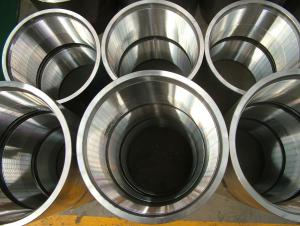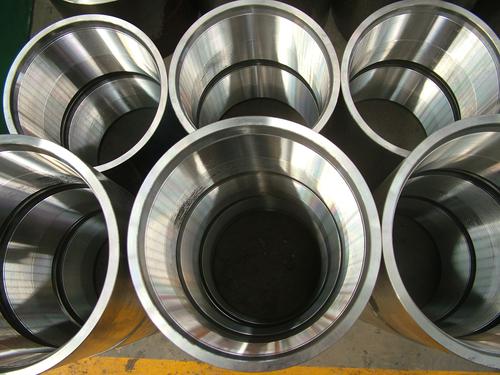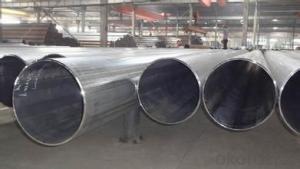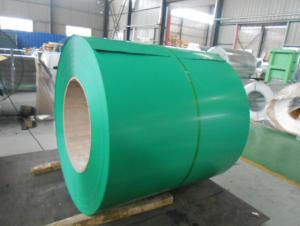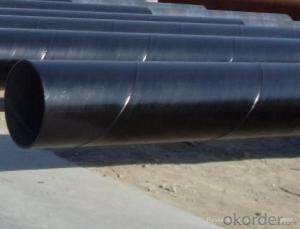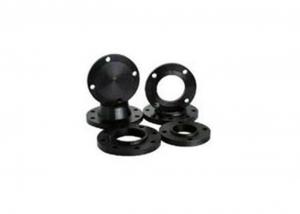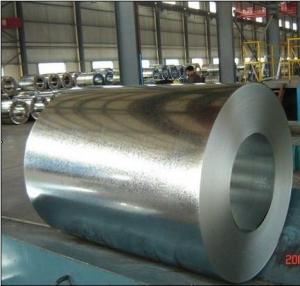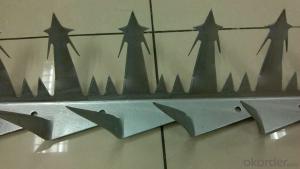Couplings for steel pipes
- Loading Port:
- China Main Port
- Payment Terms:
- TT OR LC
- Min Order Qty:
- -
- Supply Capability:
- -
OKorder Service Pledge
OKorder Financial Service
You Might Also Like
Std Ref.: API 5CT 5B ISO9001, 2008
Grade: J55,K55, N80-1,N80-Q,L80,C90,P110
Size: tubing 1.9"to4-1/2", casing 4-1/2"to13-3/8"
1.Grade: K55, N80-1, N80-Q, L80, C90, P110
2.We also supply permium thread products by customer's request
3.Size: tubing coupling from 1.9" to 4-1/2",Casing coupling fro4-1/2"to 13-3/8"
4.Type: NU, EU(tubing coupling), STC,LC,BTC(casing coupling).
5.Surface treatment: Whole phosphating, or inside phosphating and outside coating
6.Packing: By carton, wooden case, wooden pallet, or by requirements of customers
Otherwise, Our company manufactures and sells casing and tubing couplings,pup joints, tool joints, adapter pup-joints, adapter couplings, stabilizers, anchors of oil pumps and revolving sand gravitated device of well, etc. We always do business based on the principle of equality and mutual benefit, we provide the high quality and competitive price products.
- Q: How are steel pipes used in the automotive manufacturing industry?
- Steel pipes are commonly used in the automotive manufacturing industry for various purposes such as exhaust systems, fuel lines, and structural components. They provide durability, strength, and resistance to high temperatures, making them ideal for these applications.
- Q: What is the difference between steel pipes and PVC pipes?
- The main difference between steel pipes and PVC pipes lies in their material composition. Steel pipes are made of a durable and strong metal alloy, while PVC pipes are made of a lightweight and flexible plastic called polyvinyl chloride. Steel pipes are typically used for heavy-duty applications that require high strength and resistance to extreme temperatures and pressure, such as in industrial settings or for transporting liquids or gases over long distances. On the other hand, PVC pipes are commonly used for residential and commercial plumbing systems due to their affordability, ease of installation, and resistance to corrosion. Additionally, PVC pipes are not suitable for high-pressure applications and have a lower heat tolerance compared to steel pipes.
- Q: How are steel pipes measured and labeled?
- Steel pipes are typically measured and labeled based on their nominal pipe size (NPS), which refers to the inner diameter of the pipe. This measurement is expressed in inches or millimeters. Additionally, steel pipes are often labeled with their schedule or wall thickness, which is represented by a numerical value. The labeling also includes the pipe material, such as carbon steel or stainless steel, and may include other specifications and markings as required by industry standards and regulations.
- Q: Are steel pipes suitable for use in sewage treatment plants?
- Yes, steel pipes are suitable for use in sewage treatment plants. They are durable, strong, and resistant to corrosion, making them ideal for handling the harsh environment and corrosive substances found in sewage treatment plants. Steel pipes also offer excellent flow characteristics and can withstand high pressure, making them reliable for transporting wastewater and sewage within the facility.
- Q: What are the different methods of inspecting steel pipes?
- There are several methods of inspecting steel pipes, including visual inspection, ultrasonic testing, magnetic particle testing, dye penetrant testing, radiographic testing, and eddy current testing.
- Q: Can steel pipes be used for aboveground applications?
- Yes, steel pipes can be used for aboveground applications. Steel pipes are known for their strength, durability, and resistance to corrosion, which makes them suitable for various aboveground applications. They are commonly used in industries such as construction, oil and gas, water transportation, and infrastructure development. Steel pipes can be used for aboveground applications such as structural supports, handrails, fencing, scaffolding, outdoor pipelines, and various other outdoor structures. Additionally, steel pipes can be coated or painted to provide further protection against weather conditions and enhance their aesthetic appearance. Overall, steel pipes are a versatile choice for aboveground applications due to their reliability and long-lasting performance.
- Q: Are steel pipes suitable for transporting gas?
- Yes, steel pipes are suitable for transporting gas. Steel pipes are known for their durability, strength, and resistance to corrosion, making them a reliable choice for transporting various types of gases, including natural gas, oil, and other flammable substances. Additionally, steel pipes can handle high pressure and temperature conditions, ensuring the safe and efficient transportation of gas over long distances.
- Q: What is the impact resistance of steel pipes?
- The impact resistance of steel pipes is quite high due to the inherent properties of steel as a material. Steel is known for its strength and durability, which makes it able to withstand significant external forces and impacts without deforming or breaking. The impact resistance of steel pipes is further enhanced by their construction and design. Steel pipes are typically made using various manufacturing techniques such as seamless or welded construction, which ensures uniformity and strength throughout the pipe structure. This construction process eliminates weak points or seams that could compromise the impact resistance of the pipe. Moreover, steel pipes can be engineered to meet specific requirements for impact resistance based on the intended application. Different grades and types of steel can be used to achieve varying levels of impact resistance, allowing for customization to suit different industries and environments. The high impact resistance of steel pipes is particularly advantageous in industries such as construction, oil and gas, and transportation, where pipes are subjected to heavy loads, pressure, and potential impacts. Steel pipes can withstand these conditions, making them a reliable choice for various applications. In summary, the impact resistance of steel pipes is excellent due to the inherent strength and durability of steel as a material, as well as the construction techniques used in their manufacturing. Steel pipes can withstand significant external forces and impacts, making them a reliable and robust choice for a wide range of industries and applications.
- Q: What are the common grades of steel used in pipes?
- The common grades of steel used in pipes include ASTM A53, ASTM A106, and API 5L.
Send your message to us
Couplings for steel pipes
- Loading Port:
- China Main Port
- Payment Terms:
- TT OR LC
- Min Order Qty:
- -
- Supply Capability:
- -
OKorder Service Pledge
OKorder Financial Service
Similar products
Hot products
Hot Searches
Related keywords
